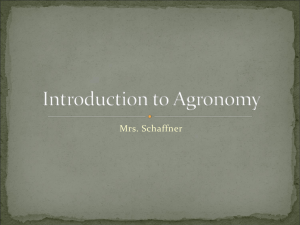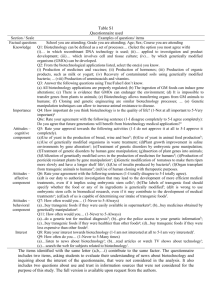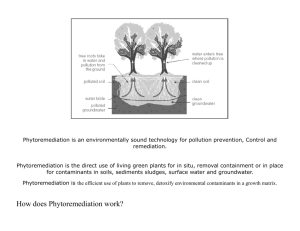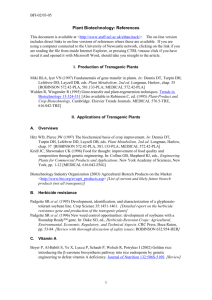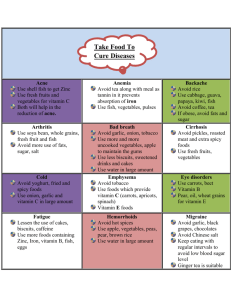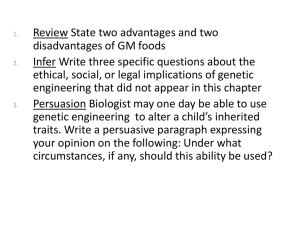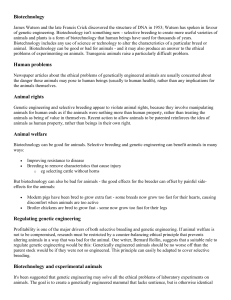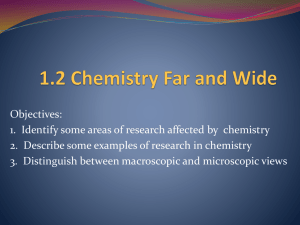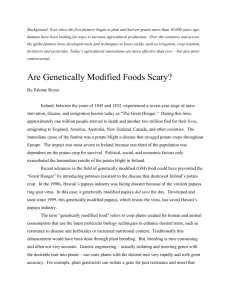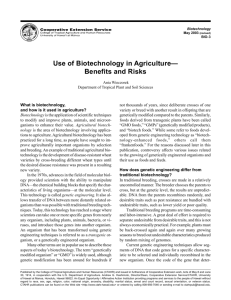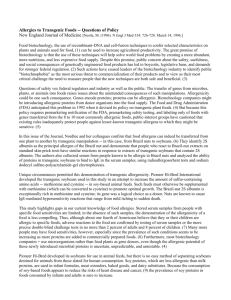glossary - EnglishforScienceandTechnology-Chem
advertisement
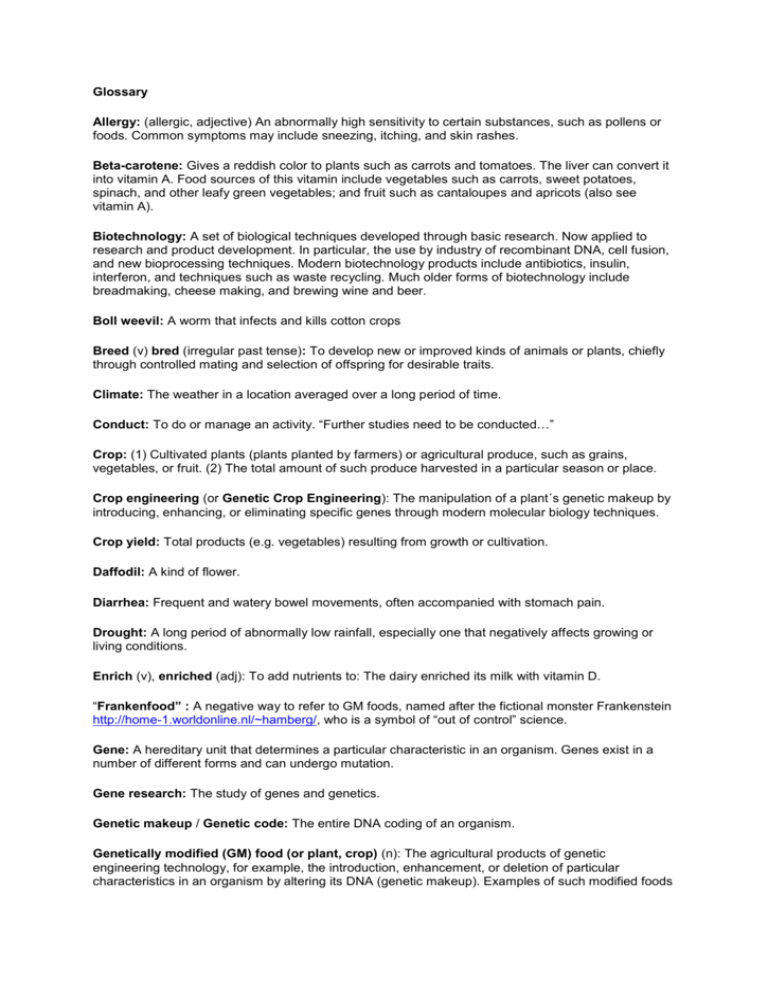
Glossary Allergy: (allergic, adjective) An abnormally high sensitivity to certain substances, such as pollens or foods. Common symptoms may include sneezing, itching, and skin rashes. Beta-carotene: Gives a reddish color to plants such as carrots and tomatoes. The liver can convert it into vitamin A. Food sources of this vitamin include vegetables such as carrots, sweet potatoes, spinach, and other leafy green vegetables; and fruit such as cantaloupes and apricots (also see vitamin A). Biotechnology: A set of biological techniques developed through basic research. Now applied to research and product development. In particular, the use by industry of recombinant DNA, cell fusion, and new bioprocessing techniques. Modern biotechnology products include antibiotics, insulin, interferon, and techniques such as waste recycling. Much older forms of biotechnology include breadmaking, cheese making, and brewing wine and beer. Boll weevil: A worm that infects and kills cotton crops Breed (v) bred (irregular past tense): To develop new or improved kinds of animals or plants, chiefly through controlled mating and selection of offspring for desirable traits. Climate: The weather in a location averaged over a long period of time. Conduct: To do or manage an activity. “Further studies need to be conducted…” Crop: (1) Cultivated plants (plants planted by farmers) or agricultural produce, such as grains, vegetables, or fruit. (2) The total amount of such produce harvested in a particular season or place. Crop engineering (or Genetic Crop Engineering): The manipulation of a plant´s genetic makeup by introducing, enhancing, or eliminating specific genes through modern molecular biology techniques. Crop yield: Total products (e.g. vegetables) resulting from growth or cultivation. Daffodil: A kind of flower. Diarrhea: Frequent and watery bowel movements, often accompanied with stomach pain. Drought: A long period of abnormally low rainfall, especially one that negatively affects growing or living conditions. Enrich (v), enriched (adj): To add nutrients to: The dairy enriched its milk with vitamin D. “Frankenfood” : A negative way to refer to GM foods, named after the fictional monster Frankenstein http://home-1.worldonline.nl/~hamberg/, who is a symbol of “out of control” science. Gene: A hereditary unit that determines a particular characteristic in an organism. Genes exist in a number of different forms and can undergo mutation. Gene research: The study of genes and genetics. Genetic makeup / Genetic code: The entire DNA coding of an organism. Genetically modified (GM) food (or plant, crop) (n): The agricultural products of genetic engineering technology, for example, the introduction, enhancement, or deletion of particular characteristics in an organism by altering its DNA (genetic makeup). Examples of such modified foods or foods that will likely be modified in the near future include: apples, canola, corn, grapevines, lentils, lettuce, maize, papaya, peas, pineapples, potatoes, soy beans, sugarcane, tomatoes, and wheat. Genetically modify (v): The use of modern biotechnology to change the genetic makeup of an organism (a plant) by inserting individual gene(s) that have been isolated in the laboratory into the genome of a living organism. Golden rice: A genetically engineered form of rice (http://www.biotech-info.net/golden.html) which has been infused with vitamin A (a vitamin not usually found in rice). Gregor Mendel: Founder of the science of genetics (1822-1884). An Austrian monk and botanist. His breeding experiments on garden peas and subsequent formulation of the laws of heredity formed the basis for the study of genetics. Immune (v) (Immunity, (n): Protected against, infectious disease. Ingredient: One part of a mixture or recipe. Insect resistant: Description of a plant that is not affected (or is affected only minimally) by insects. Monarch butterfly: A type of butterfly common in North America. http://www.learner.org/jnorth/sm/aboutmbsf.html Nutrition: (1) Foods necessary for a healthy diet. (2) The physical and chemical process by which food is converted into body tissue. Pollen: The powder produced by seed plants, and most plentiful in Spring. A common cause of allergic reactions. Pesticide: A chemical that is used to kill unwanted organisms such as rats or weeds. These chemicals often act as nerve poisons, and they are hazardous to animals and humans. Some pesticides can cause nerve or liver damage, birth defects, and cancer in humans. Plant breeding: The genetic modification of crop plants, with the hopes of improving insect resistance and the nutritional content, as well as creating plants with high yield and enhanced quality. Plant trait: A genetically determined characteristic of a plant such as its height, resistance to insects and bad weather, and its typical crop yield. Rash: A skin eruption or reddening of the skin, often with itchiness. Resistant (adj) Resist (verb) Resistance (noun): (1) Relating to or conferring immunity (to disease or infection) (2) incapable of being affected “disease resistant”. Seed: The fertilized ripened ovule of a flowering plant containing an embryo and capable normally of germination to produce a new plant. Shellfish: Any aquatic animal whose external covering consists of a shell, for example, oysters, clams, lobsters, and crabs. Symptom: Any evidence of disease or of a patient’s condition as perceived by the patient, diagnosis, or a change in a patient’s condition. Toxic: Poisonous. Trait: A genetically determined characteristic or condition. Transgenic: Having genes that have been transferred from another species or breed, for example, a transgenic plant, transgenic rice, transgenic technology, transgenic crops, and transgenic foods. Transfer (v): The movement of something from one place to another. Violently ill: Extremely sick. Vitamin A: A vitamin occurring principally in fish-liver oils, milk, and some yellow and dark green vegetables. Its deficiency causes hardening and roughening of the skin, night blindness, and degeneration of mucous membranes. Vomit (v): To lose the stomach contents through the mouth, often when feeling ill. Weed (n): A plant considered undesirable, unattractive, or troublesome, especially one growing where it is not wanted, as in a garden
